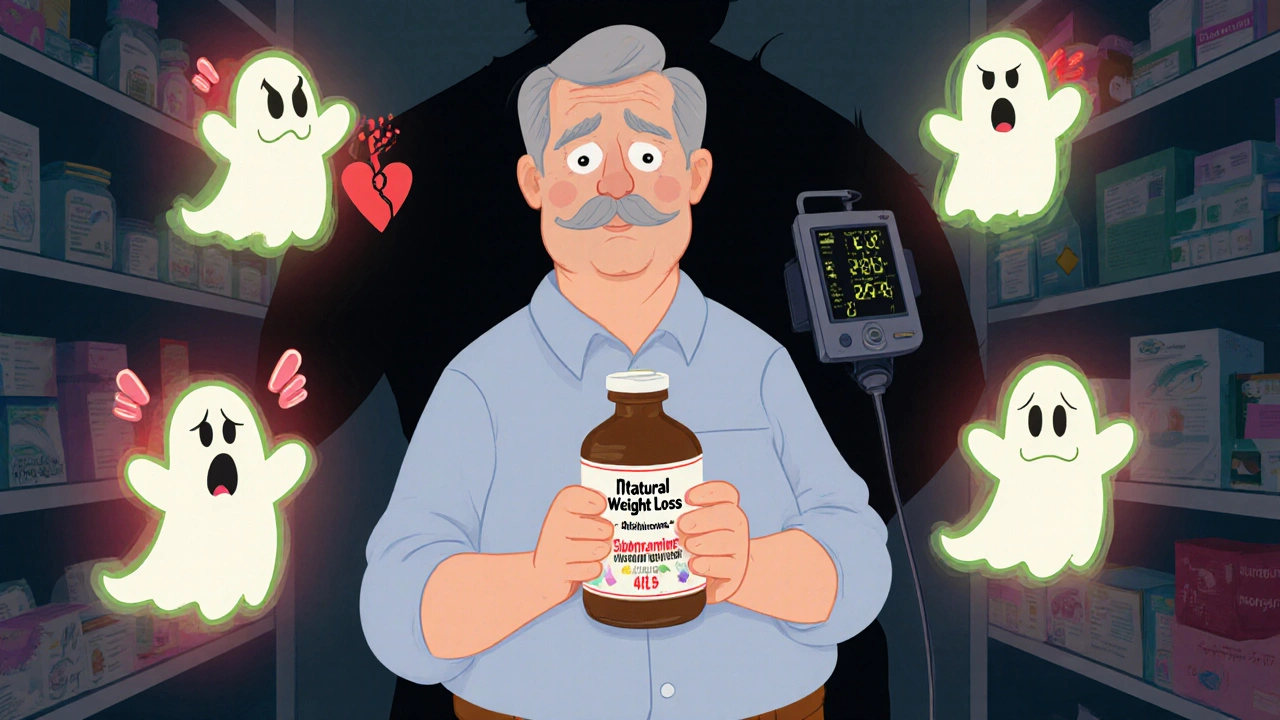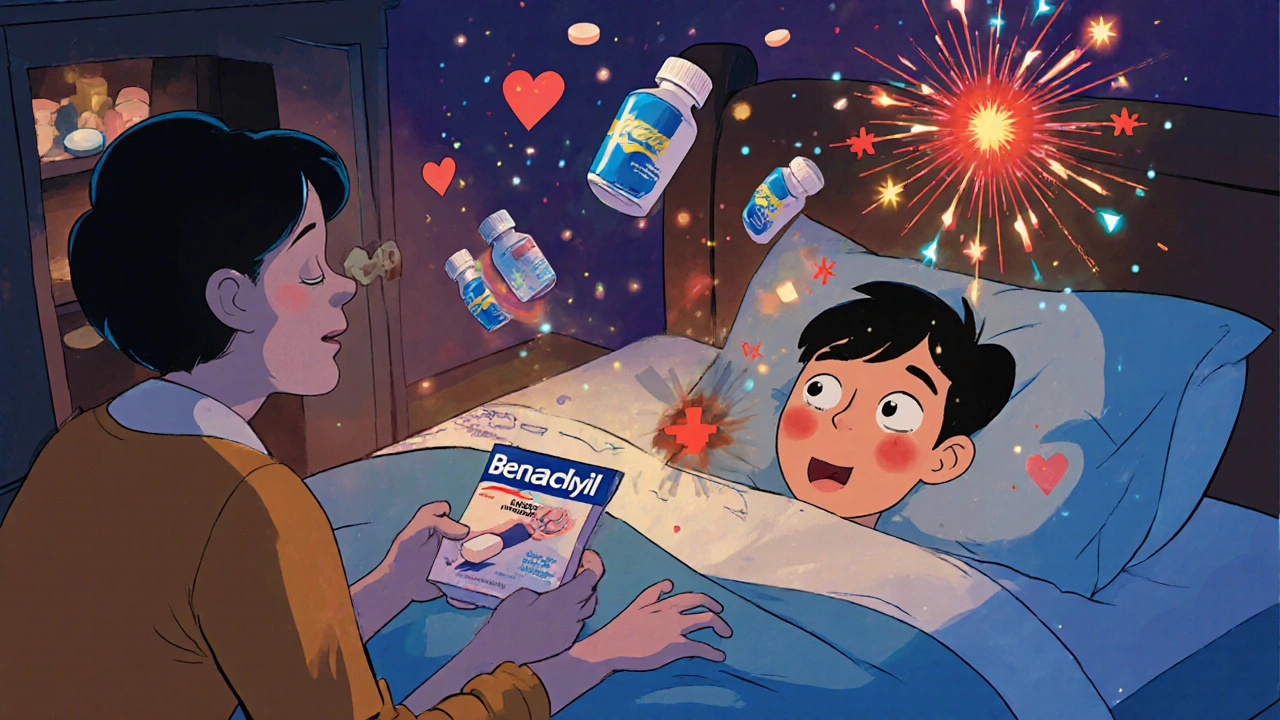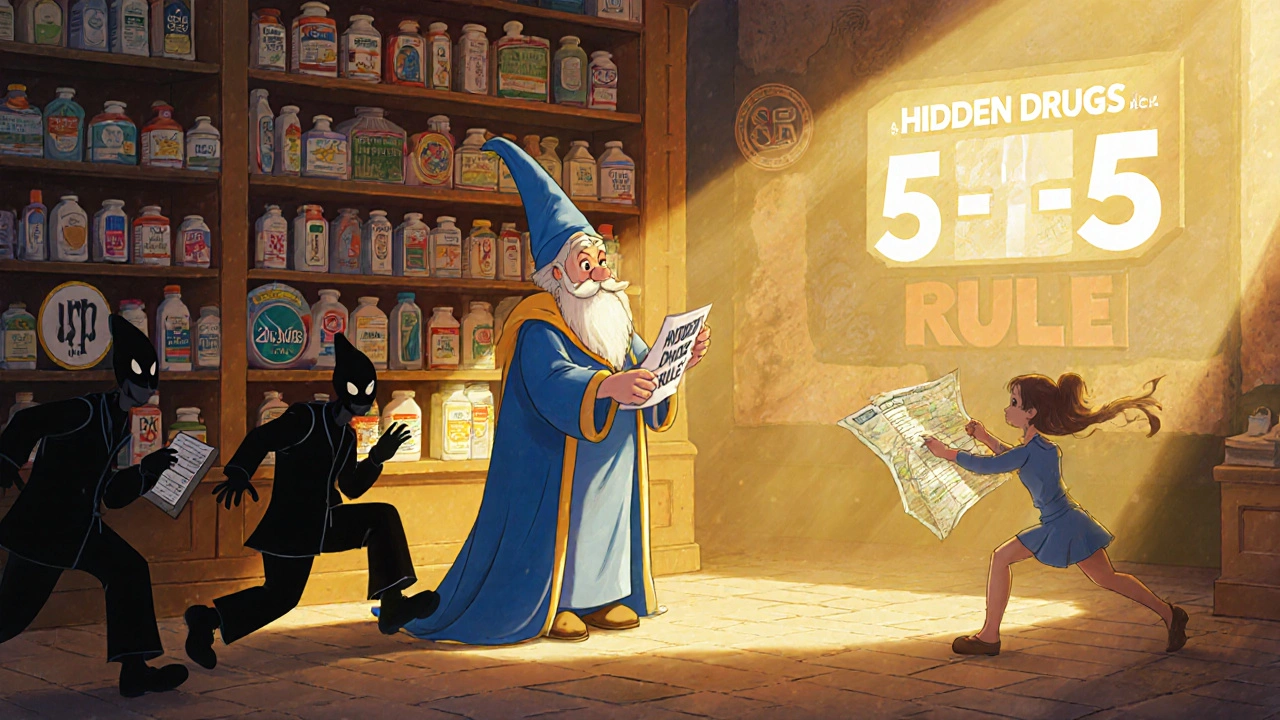Over-the-Counter Medication Safety: Hidden Ingredients and Interactions You Can't Afford to Ignore

Medication Safety Checker
Check Your Medication Safety
Enter your medications and supplements below to see if they might contain hidden dangerous ingredients or create dangerous interactions. Based on FDA data and the article content.
Every year, millions of Americans reach for over-the-counter (OTC) meds without a second thought. A headache? Grab an ibuprofen. Trouble sleeping? Reach for diphenhydramine. Want to lose weight or boost performance? There’s a supplement for that. But here’s the scary part: many of these products contain hidden ingredients you won’t find on the label. And those hidden drugs can cause heart attacks, liver failure, or even death-especially when mixed with your prescription meds.
What’s Really in Your Supplement Bottle?
You bought a "natural" weight loss pill because it promised quick results. You took a sexual enhancement supplement because it claimed to work like Viagra-but without a prescription. What you didn’t know? The bottle likely contained sibutramine, sildenafil, or tadalafil-active ingredients from banned or prescription-only drugs. Between 2007 and 2021, the FDA found over 1,000 dietary supplements laced with unapproved pharmaceuticals. The most common targets? Weight loss and sexual enhancement products. Nearly 54% of contaminated supplements were sold for weight loss. Another 35% were marketed as libido boosters. And here’s the kicker: 20% of these products had multiple hidden drugs inside. One product was found to contain six different prescription medications. Sibutramine, once used in the weight loss drug Meridia, was pulled from the U.S. market in 2010 after a study showed it raised the risk of heart attack and stroke by 16%. Yet it still shows up in supplements today. Phenolphthalein, a laxative linked to cancer in animal studies, was found in 124 weight loss products between 2009 and 2021. And sildenafil? That’s the exact same ingredient in Viagra. It’s been found in over 280 supplements sold as "natural" sexual enhancers. No warning. No dosage info. Just a dangerous drug hiding behind the word "herbal."Why This Isn’t Just About Supplements
It’s not just supplements. Even common OTC painkillers like ibuprofen, naproxen, and aspirin carry serious risks. The American College of Gastroenterology says NSAIDs cause around 100,000 hospitalizations and 16,500 deaths every year in the U.S. alone. These numbers don’t even include cases where hidden ingredients make things worse. Think about it: you take ibuprofen for back pain. You also take a blood pressure med. Now you add a "joint support" supplement that secretly contains a steroid or another NSAID. Suddenly, you’re doubling your dose without knowing it. Your stomach lining starts breaking down. Your kidneys struggle. Your blood pressure spikes. And you have no idea why. Even "harmless" sleep aids can be dangerous. Diphenhydramine-the active ingredient in Benadryl-is commonly found in OTC sleep and allergy meds. But in 2020-2021, teens started doing the "Benadryl challenge" on TikTok, taking massive doses to get high. The result? At least three deaths. Dozens of hospitalizations. Symptoms like seizures, heart arrhythmias, and extreme confusion. All from a drug many parents keep in their medicine cabinet.How Hidden Ingredients Cause Deadly Interactions
The real danger isn’t just the hidden drug itself-it’s what happens when it mixes with what you’re already taking. If you’re on blood thinners like warfarin and take a supplement with hidden aspirin, you could bleed internally. If you’re diabetic and take a weight loss pill with sibutramine, your blood sugar could go haywire. If you’re on antidepressants and use a supplement with hidden stimulants, you risk serotonin syndrome-a potentially fatal condition. Dr. Pieter Cohen, a researcher at the University of Connecticut, says it plainly: "Hidden active ingredients are problematic because they pose the risk of serious drug interactions." He’s studied this for years. His team found that people who took contaminated supplements were far more likely to end up in the ER with unexplained symptoms-rapid heartbeat, chest pain, vomiting, high blood pressure-that doctors couldn’t explain until they tested the product. One Reddit user shared his story: he took a "natural" weight loss pill and woke up with his blood pressure at 180/110. He thought it was stress. Turns out, the pill had sibutramine. He didn’t know he had high blood pressure before. The supplement made it worse-and nearly killed him.
Who’s Most at Risk?
You might think this only happens to people buying sketchy products off shady websites. But that’s not true. Elderly patients are especially vulnerable. On average, they take 4.9 prescription medications plus multiple supplements. That’s a perfect storm for dangerous interactions. One wrong combo can send them to the hospital. Teens and young adults are another high-risk group. Social media challenges have turned OTC meds into party drugs. Diphenhydramine. Cough syrup with dextromethorphan. Even melatonin in massive doses. All of these can cause hallucinations, seizures, or cardiac arrest. And then there’s the silent majority: people who assume "natural" means "safe." That’s a deadly myth. The Dietary Supplement Health and Education Act of 1994 lets supplement makers sell products without proving they’re safe. The FDA can’t step in until someone gets hurt. By then, it’s often too late.How to Protect Yourself
You don’t have to live in fear-but you do need to be smart.- Check the FDA’s Health Fraud Product Database. Type in the product name or brand. If it’s listed, don’t buy it. If it’s not listed, that doesn’t mean it’s safe-but it’s a start.
- Look for third-party seals. USP, NSF International, and ConsumerLab.com test supplements for contaminants. Their stamps don’t guarantee safety, but they mean the product was independently checked.
- Use the 5-5-5 Rule. Before buying any OTC product: spend 5 minutes Googling it, 5 minutes checking the FDA database, and 5 minutes asking your pharmacist.
- Keep a full medication list. Write down every pill, capsule, herb, and vitamin you take-including dosages. Bring it to every doctor’s visit. Studies show 63% of supplement-related adverse events happen because patients didn’t tell their doctors what they were taking.
- Avoid "miracle" claims. If a weight loss supplement promises "lose 20 pounds in 2 weeks," or a sexual enhancer says "works better than Viagra," run. Over 73% of weight loss supplements with these claims contain hidden drugs.
- Never mix OTC meds with alcohol. That’s a recipe for liver damage, especially with acetaminophen or NSAIDs.

What’s Being Done-and Why It’s Not Enough
The supplement industry is worth over $55 billion globally. And it’s growing fast. But the FDA has only 17 full-time staff members dedicated to overseeing all dietary supplements. That’s less than one person per 1,000 products on the market. The Government Accountability Office found that fewer than 0.3% of adverse events from supplements are reported to the FDA. That means for every one case that shows up in official records, there are hundreds going unreported. In 2023, Congress introduced the OTC Medication Safety Act (H.R. 2509). It would require mandatory reporting of side effects and give the FDA more power to pull dangerous products. It has bipartisan support. But it’s still stuck in committee. Meanwhile, contamination rates are rising. A 2023 NIH analysis showed that 57% of contaminated products were identified between 2012 and 2016-and that number keeps climbing. McKinsey & Company predicts hidden ingredient contamination will grow 15-20% per year through 2025, mostly because online sales bypass traditional retail checks.Bottom Line: Don’t Assume It’s Safe
OTC medications and supplements aren’t harmless. They’re powerful chemicals. And without strict oversight, dangerous ingredients slip through. The burden is on you to protect yourself. You wouldn’t take a prescription drug without reading the label. Don’t treat OTC meds any differently. Ask questions. Do your research. Talk to your pharmacist. Keep a list. And if something feels off-your heart races, your stomach hurts, you feel dizzy-stop taking it. And get it tested. Your health isn’t worth gambling on a label that says "all-natural."Are over-the-counter supplements really dangerous?
Yes, some are. Between 2007 and 2021, the FDA identified over 1,000 dietary supplements containing hidden prescription drugs like sildenafil (Viagra), sibutramine (a banned weight loss drug), and phenolphthalein (a carcinogenic laxative). These ingredients are added to make products seem more effective-but they’re not listed on the label. Taking them can cause heart attacks, liver failure, or dangerous interactions with other medications.
How do I know if my supplement has hidden ingredients?
Check the FDA’s Health Fraud Product Database by searching the product name or brand. Look for third-party verification seals like USP, NSF, or ConsumerLab.com-these indicate independent testing for contaminants. Avoid products with vague claims like "miracle weight loss" or "natural Viagra substitute." And always ask your pharmacist to review your supplements.
Can OTC painkillers like ibuprofen be dangerous?
Yes. NSAIDs like ibuprofen and naproxen cause about 100,000 hospitalizations and 16,500 deaths each year in the U.S. due to stomach bleeding, kidney damage, and heart problems. The risk goes up if you take them with other NSAIDs, blood thinners, or hidden ingredients in supplements. Never combine multiple pain relievers without checking with a doctor or pharmacist.
Why are supplements not regulated like prescription drugs?
Under the Dietary Supplement Health and Education Act of 1994, supplement makers don’t need FDA approval before selling their products. The FDA can only act after a product is on the market and someone gets hurt. This creates a dangerous gap: companies can sell untested, contaminated products for years before the FDA catches them. The agency also has only 17 full-time staff assigned to oversee the entire supplement industry.
What should I do if I think a supplement made me sick?
Stop taking it immediately. Contact your doctor and report the reaction to the FDA through MedWatch, their online reporting system. Save the product and packaging-it may be tested. If you took it with other medications, bring your full medication list to your appointment. Many adverse events go unreported, so your report could help prevent others from being harmed.
Are "natural" or "herbal" supplements safer than synthetic ones?
No. The term "natural" has no legal meaning in supplement labeling. Many of the most dangerous products are marketed as "all-natural" or "herbal." In fact, 87% of sexual enhancement supplements labeled as natural contain hidden sildenafil or tadalafil. Natural doesn’t mean safe-it just means the ingredient comes from a plant or mineral, not a lab. Many plants contain powerful, toxic compounds.
Can I trust supplements with USP or NSF certification?
They’re more reliable than uncertified products, but not foolproof. USP, NSF, and ConsumerLab.com test for label accuracy, heavy metals, and known contaminants. But they don’t test for every possible hidden drug. They also don’t guarantee effectiveness. Still, choosing certified products reduces your risk significantly. Look for their seal on the bottle-don’t just rely on marketing claims.
Why don’t more people know about this?
Because the problem is hidden-literally. The ingredients aren’t on the label, so consumers don’t know they’re taking drugs. The media rarely covers it unless someone dies. And the supplement industry spends millions on marketing that paints these products as safe and natural. Even though 75% of U.S. adults have confidence in supplement safety, 58% use them regularly-and most have no idea what’s actually inside.
Is it safe to take OTC meds with alcohol?
No. Mixing alcohol with acetaminophen (Tylenol) can cause severe liver damage. Alcohol with NSAIDs like ibuprofen increases the risk of stomach bleeding. Even with sleep aids like diphenhydramine, alcohol can cause extreme drowsiness, slowed breathing, or loss of consciousness. Always read the label. If it says "do not take with alcohol," don’t.
What’s the best way to avoid hidden ingredients?
The best protection is awareness and verification. Use the 5-5-5 rule: spend 5 minutes researching the product online, 5 minutes checking the FDA database, and 5 minutes talking to your pharmacist. Stick to brands with third-party testing. Avoid anything promising fast results. And always tell your doctor what you’re taking-even if you think it’s "just a supplement."

Just want to say: if you're taking anything labeled 'natural' for weight loss or sex, you're already playing Russian roulette. I'm a pharmacist, and I see this every week. People come in with chest pain, panic attacks, or liver enzymes through the roof-and they swear they 'only took a supplement.' No, buddy. You took a hidden drug. Always check the FDA database. Always. It takes five minutes. Seriously.
Oh wow, so now we're supposed to believe that 'natural' means 'dangerous'? Next you'll tell me water is toxic if you drink too much. 😏
Yeah, and salt is toxic too-but we don't sell it in bottles labeled 'miracle detox powder' and tell people to take 10 tablespoons at once. You're missing the point. It's not about natural vs synthetic. It's about unregulated, unlabeled, untested pharmaceuticals hiding in plain sight. The FDA doesn't even have enough staff to look at 1% of these products. That's not paranoia. That's policy failure.
LMFAO. You guys are acting like every supplement is a death trap. I took 'Herbal Viagra' for years. Felt great. Never got hospitalized. Maybe the real problem is people who can't read a label? Or maybe the FDA just wants to protect Big Pharma's profits? 🤔
Well, well, well... someone's been drinking the kool-aid... or should I say, the sibutramine-laced 'FatBurner Max 3000'...? Let me guess-you also think fluoride is a government mind-control agent? And that vitamin C cures cancer? And that the moon landing was faked? Because if you're going to ignore science, might as well go full conspiracy mode, right? 🤡
I get it. We all want quick fixes. I used to take those 'fat-burning' teas before breakfast. Thought they were harmless. Then my heart started skipping beats. Turned out it had yohimbine and caffeine in doses that would make a caffeine pill blush. I stopped. Talked to my doctor. Got my bloodwork done. It’s not about fear. It’s about awareness. We’re not being alarmist-we’re being responsible. And honestly? It’s okay to say 'I don’t know' and ask someone who does.
Bro, this is why I always tell my younger cousins: if it sounds too good to be true, it’s probably a drug in disguise. I come from India-we’ve seen this for decades. Ayurvedic products with steroids, unmarked diuretics, even hidden insulin. The same thing is happening here. It’s global. The internet made it easy. The labels made it invisible. But knowledge? Knowledge is the real supplement. Keep asking questions. Keep checking. Don’t trust the bottle. Trust the process.
Just had a 78-year-old patient come in with a GI bleed. She was taking 'joint support' + ibuprofen + blood thinner. The supplement had celecoxib in it. Hidden. No label. She thought it was 'just turmeric.' 😭 We saved her. But so many don't make it. Please. Talk to your pharmacist. Save someone's life.
Y'all are stressing too much. I take melatonin, omega-3, and a 'natural energy booster'-all from GNC. I'm fine! 😊 My grandma takes 12 pills a day and still dances at weddings. Maybe we need to chill? 🤗
It is an incontrovertible fact that the regulatory framework governing dietary supplements constitutes a systemic failure of the American medical-industrial complex, wherein profit-driven entities exploit legislative loopholes to disseminate pharmacologically active substances under the deceptive guise of 'nutritional support.' The FDA's institutional incapacity to preemptively verify product integrity renders the entire category of OTC supplements a biohazardous lottery. One must, therefore, adopt a posture of radical epistemic skepticism toward all non-prescription ingestibles.
Listen-I get the fear. But don’t let fear stop you from trying to feel better. Just be smart. Check the FDA list. Look for USP or NSF. Ask your pharmacist. Don’t buy anything that says 'lose 20 lbs in 2 weeks.' That’s not science-that’s snake oil. You can still take supplements safely. You just gotta do your homework. You got this.
Why is this even a debate? You people are brainwashed by capitalism! The FDA is owned by Big Pharma! They want you sick so you keep buying pills! They let dangerous stuff in because it makes money! And now you’re blaming the victim? I took a 'weight loss capsule' and my blood pressure spiked-guess what? The company disappeared! No one cares! They just want your money! You’re all sheep!
What if the hidden ingredients aren’t the problem? What if the real danger is that you’re being conditioned to distrust your body? What if the FDA, the pharmaceutical industry, and the media are all working together to make you believe that only their approved chemicals are safe? What if your body knows how to heal itself-and these 'hidden drugs' are just the first step in a larger agenda to chemically control the population? The supplement industry might be shady… but so is everything else. Are you sure you’re not the one being manipulated?
People like you who say 'just ask your pharmacist' are the reason this problem persists. Most pharmacists don’t know what’s in these supplements either. They’re overworked, underpaid, and handed a bottle with 27 ingredients listed as 'proprietary blend.' You think they’re going to run a mass spectrometer on it? Please. The system is broken. Don’t rely on anyone. Stop taking supplements entirely. Your body doesn’t need them.
Let’s be real: if you’re taking anything labeled 'herbal Viagra,' you’re not just risking your health-you’re risking your dignity. And if you think the FDA is your protector, you’ve never read their enforcement reports. They shut down one product, ten pop up. The market is a swamp. And you? You’re the mosquito.